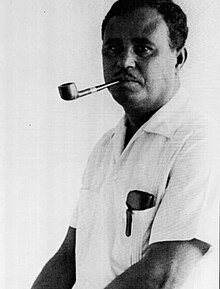Edward Oliver LeBlanc | |
|---|---|
 | |
| 1st Premier of Dominica | |
| In office 1 March 1967 – 27 July 1974 | |
| Deputy | Nicholson Ducreay Ronald Armour |
| Succeeded by | Patrick John |
| Chief Minister of Dominica | |
| In office 21 January 1961 – 1 March 1967 | |
| Monarch | Elizabeth II |
| Preceded by | Frank Baron |
| Personal details | |
| Born | 3 October 1923 Vieille Case, Dominica |
| Died | 29 October 2004 (aged 81) Vieille Case, Dominica |
| Political party | Dominica Labour Party |
| Spouse |
Ethel Patrick (m. 1949) |
Edward Oliver LeBlanc (3 October 1923 – 29 October 2004) was a Dominican politician who served as the chief minister from January 1961 to 1 March 1967 and as the first premier from 1 March 1967 to 27 July 1974. Born in Vieille Case, a village in the north of the island, LeBlanc attended the local school and studied agriculture at the Imperial College of Tropical Agriculture in Trinidad. He worked in the civil service and became a member of the Dominica Trade Union. An early member of the Dominica Labour Party (DLP), he served as a representative in the country's Legislative Council representing the constituency of Portsmouth between 1957 and 1958, and as a representative of Dominica in the Federal Parliament of the West Indies Federation upon its foundation in 1958. LeBlanc left the federation in 1960 to run for election to the national legislature.
In the 1961 general election, LeBlanc was elected to the constituency of Roseau South and was sworn in as the chief minister and minister of finance. He was dedicated to representing the working class, particularly developing the nation's infrastructure, education and culture. He worked to develop Dominica's roads system and championed the native dance bélé, the Kwéyòl language and the country's national day. On 1 March 1967, Dominica was granted associated statehood and LeBlanc became the first premier. The DLP began to face challenges from the newly established Dominica Freedom Party and the growing youth and Rastafarian movements. In the 1970 general election, LeBlanc was challenged by three of his ministers, Nicholson Ducreay, W. S. Stevens and Mabel Moir James, but he formed a new party for the election, the LeBlanc Labour Party and succeeded in winning eight of the eleven seats in the legislature.
LeBlanc resigned as premier on 27 July 1974 and was replaced by his deputy premier Patrick John. He was a delegate at the Constitutional Conference in May 1977 but otherwise retired from public life, returning to his hometown in Vieille Case. LeBlanc was honoured with the Dominica Award of Honour in 1976 and he has been described as "father of the nation".